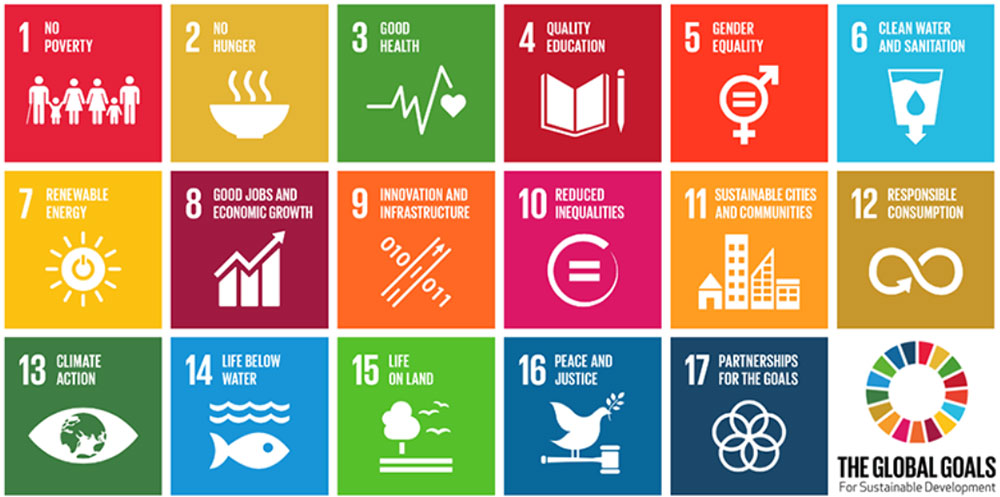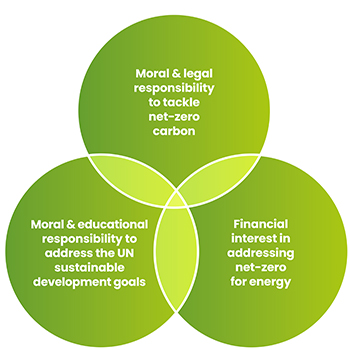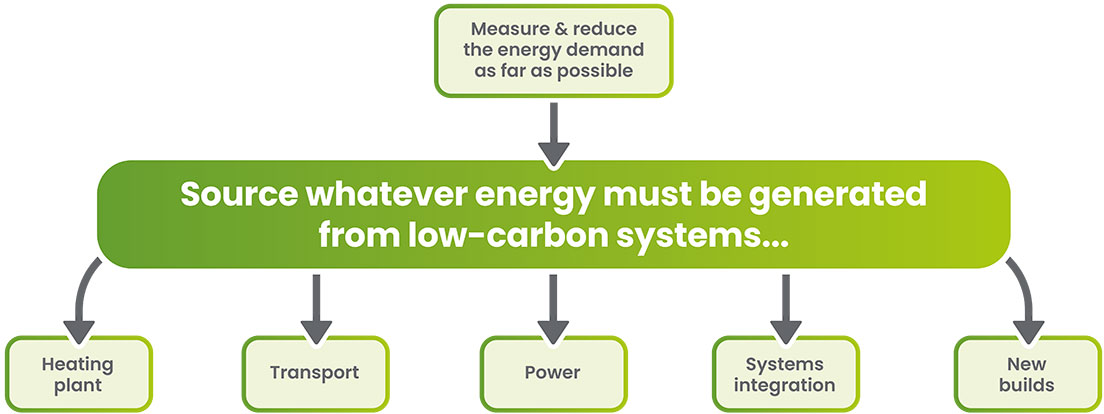Become a zero-carbon school
Quick links:
The whole world needs to reduce its carbon emissions to reverse global warming. Schools and colleges face some particular challenges; but there are opportunities as well, especially for those that take an early lead.
This page offers advice for schools and colleges.

The UK has a target to cut greenhouse gas emissions to net-zero by 2050
That may sound a long time away but there are some technical challenges to be overcome that will take decades. The way we generate and use power, heat and transport is already changing but the pace of change will need to accelerate. The decarbonisation of heat at the national scale is probably going to prove the most demanding aspect and requires urgent attention and action.
All of this will have an impact on schools and change the nature of the school estate. In many ways – on the surface – the school of 2050 will look like the school of 2020: a mixture of green spaces and old and new buildings, some more suitable for their purpose than others. However, the underlying energy infrastructure for provision of power, heat and transport will be radically different.
Do not despair or be overly daunted: it is all do-able. ReEnergise has already assessed, to varying degrees, the scope for achieving a net-zero school estate in over 200 schools and not yet encountered one that would not be able to get there eventually: we can reasonably conclude that there will always be a pathway to net-zero. However, it will be more challenging than maintaining the status quo and has become an issue that is going to require rather more of the school’s energy, time and attention than has probably been the case in the past.
The following FAQs discuss how to reduce your greenhouse gas emissions and become a net-zero school. We’ll add to them from time to time: we’re all learning from experience when it comes to net-zero in schools. And please feel free to contact us with further questions or suggestions if you have them, based on your own experience to date.
Rather have this explained on a call?
If it’s sounding interesting but a bit indigestible we’d much rather discuss it with you the old-fashioned way. We’re used to briefing busy school staff and a phone call or video chat can be much easier in the long-run than wading through a website.
Common FAQs
on becoming zero-carbon
Being zero-carbon means that your use of energy to provide power, heat and transport doesn’t create carbon and other harmful greenhouse gas emissions. Strictly speaking for schools we should be talking about net zero-carbon, meaning that the school’s emissions are reduced as far as possible and then something else is done to offset the remaining balance. That is a more realistic approach than trying to reduce a school’s emissions right down to zero: and it’s a reasonable approach so long as the emphasis remains on reducing emissions rather than seeing offsetting as a get-out-of-jail-free card. Offsetting should be seen as a last resort.
Greenhouse gas emissions are now categorised in 3 scopes:
- Scope 1 = direct emissions from resources owned & controlled by the school: e.g. heating fuel.
- Scope 2 = indirect emissions from the generation of energy used by the school but by resources not owned by it: e.g. purchased grid power.
- Scope 3 = any emissions arising from the operation of the school not included in scopes 1 and 2: e.g. emissions from the catering or other supply chains.
The unit of measure: Carbon Dioxide equivalent (CO2e; tCO2e)
Whilst we’re on definitions, increasingly schools are becoming more interested in another interpretation of net-zero: net-zero for energy. The distinction is summarised below:
- Net-zero carbon = The school does not contribute to greenhouse gas emissions (GHG) across its entire spectrum of operations, or uses offsetting to account for any irreducible minimum. In practice this means ceasing to use or rely on fossil fuels for any part of the school operation, including in the supply chain and off the school estate, or offsetting where that cannot be achieved. N.B. think 90% decarbonisation and perhaps 10% offsetting, as a last resort.
- Net-zero for energy = The school generates as much energy as it uses – but remains reliant on some external supplies at certain times.
- Prognosis for net-zero in schools: All UK schools can achieve net-zero carbon, given time and the necessary funding. Most schools cannot achieve net-zero for energy, but can get part of the way.
Note that net-zero carbon is about reducing carbon emissions whereas net-zero energy is primarily driven by the intent to reduce operating costs.
There is also the wider issue of becoming sustainable in its broadest sense: net-zero is only a subset of sustainability more broadly. In this context, schools are increasingly using the UN’s 17 Sustainable Development Goals as the guide.

Our view of the relationship between all 3 objectives in schools is captured by this Venn Diagram:

The answer is in four parts: our children’s future, legislation, reducing operating costs, and getting a competitive advantage.
Excessive carbon in the atmosphere is causing climate change. We’re already experiencing the effects but with each passing decade they will become more severe. It’s the children in our schools who will grow up to face the brunt of the onslaught. You should be under no illusion that getting to net-zero will be an easy ride: it won’t. But it’s worth reminding ourselves of the underlying rationale for it from time to time.
The government has already begun the process of legislating to phase out the use of the worst fossil fuels, namely coal and oil. Others will follow. That process will take time, given the scale of the task and infrastructure implications: but it will happen. Increasingly, school new builds will be required to meet exacting standards of energy efficiency and retrospective action will be required to convert school estate infrastructure for the provision of power, heat and transport to alternative low-carbon systems. Government intent is summarised by this timeline:

Use the natural replacement cycle to phase out fossil fuel plant.
Use market forces to drive change, but some carrot & stick.
Rebalance energy prices to favour heat pumps.
Public sector to lead by example, using public funds e.g. LCSF and PSDS.
Note the point about the natural replacement cycle: that means schools won’t be forced to throw out serviceable heating plant, but any heating plant failing or needing scheduled replacement after the target date will have to be replaced by a low-carbon alternative. This means that schools could in practice still be using fossil fuel heating plant as late as 2050.
Operating costs can be reduced by making the school buildings more energy efficient, which is one side of the net-zero coin. Furthermore, every school can take steps to reduce energy usage without spending much money, such as running a campaign to get staff and students to become more energy-aware and stop being wasteful. However, there is no realistic pathway to net-zero carbon simply by steadily reducing energy usage: ultimately every school will need to install low-carbon systems, especially for the provision of heat. These low-carbon heating systems are expensive to install, which will be a barrier for some schools. The government is running grant schemes to support the public sector, including schools, but independent schools will need to find the finance themselves. Whether these systems will reduce operating costs once installed will depend largely on the relative price of fuels, in particular the price of grid power in comparison with grid gas. The government recognises this and has already declared its intent to adjust the balance so that it does not penalise heat pumps in the way that it does at present.
Competition between schools is intense and parents and children will increasingly want to know what each school is doing to reduce carbon emissions. A school’s carbon status and intent will soon become a marketing issue!
You are more likely to achieve net zero-carbon affordably if you:
- Are aware of what needs to be done;
- Are aware of what practical and financial support is available outside the school;
- Have a general strategy, with clearly defined objectives which are known and understood throughout the school.
- Have detailed, resourced plans that cover all aspects of running the school, covering scopes 1, 2 and 3.
The plan for tackling scopes 1 and 2 is an important one. This will be the part of achieving net-zero that requires the most capital outlay and will have the greatest impact on the school estate. The term now in vogue is a decarbonisation plan. That covers energy efficiencies and conversion to low-carbon systems across the three major energy usage categories in the school: power, heat and transport.
There is a recognised general approach, shown here:

Heating plant: will be largely heat pumps, but biomass on some estates. It will depend on the circumstances on the estate and – to some extent – the preferences of the school.
Transport: convert the fleet to EVs & install the supporting infrastructure.
Power: The national power grid is being converted to net-zero. With heat pumps, power consumption will increase on site. Measures will be required to ensure enough power to site; and around the site. Where possible, on-site generation will serve to compensate, but this is about cost – not carbon.
Systems Integration: make sure it all works together to optimum effect so that the school uses the cheapest available source of energy at any moment.
There are various ways to finance a project. The main options are discussed below. ReEnergise can advise you on the options and support you in securing finance. It depends to a large extent whether your school is in the public or independent sector.
Public Sector Decarbonisation Scheme (PSDS) – This is a grant scheme, administered by Salix Finance (who manage grants and loans for the public sector) that will provide grants for public sector bodies to fund heat decarbonisation and energy efficiency measures. These grants are for capital works. Schools in the public sector are eligible.
Public Sector Low Carbon Skills Fund (LCSF) – This is a grant scheme, also administered by Salix Finance that will provide grants for organisations to engage the specialist and expert advice and skills required to create a robust heat decarbonisation plan and/or detailed designs to prepare for heat decarbonisation and energy efficiency works. Schools in the public sector are eligible.
Local authority grant – These can be used alongside the options above, so long as the project accounting shows clearly the different tasks that each source of money supports. The general idea is that a school does not receive government money twice to finance the same task.
Bank loan – Bank loans can be used to finance projects. However, a school’s eligibility to use a bank loan does depend on the type of school.
Energy purchase agreement (EPA) – The concept of an EPA is that a 3rd party pays for and owns the installation and then sells the energy generated back to the school at a price which is low enough to be attractive to the school but high enough to cover the provider’s own costs and generate a return on investment. This won’t achieve the same financial savings as some of the other options but is a way to get projects done that might otherwise be unaffordable. The provider takes most of the risks, unlike in the other finance options.
Email us for a free consultation on [email protected]
If you agree that something needs to change and want to know more, please contact us. We offer a step-by-step approach to the decarbonisation of school and college estates that is intended to reduce the risks as far as possible, and avoid clients wasting money on dead ends or expensive mistakes. It starts with a free, no-obligation assessment of your estate.
Email us to arrange it at [email protected]
Schools
we’ve already helped
Here are some of the schools and colleges we’ve helped in recent years. Our support has ranged from feasibility studies all the way through to the management of installation works. Our full range of services is covered at Our Approach. Video Case Study: Ground Source Heat Pump Installation at St George’s College, Weybridge









Want to know more?
If it’s sounding interesting but a bit indigestible we’d much rather discuss it with you the old-fashioned way. We’re used to briefing busy school staff and a phone call or video chat can be much easier in the long-run than wading through a website.




